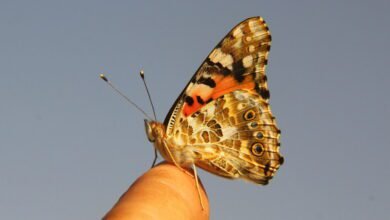GEN editors list their favorites

There is no better time than summer to read a good book. And here at GERmany of our top summer reading picks are also great science books. Here’s a list of some of the books GEReditors will be reading it this summer. The books are new and old, nonfiction and fiction, and cover topics ranging from COVID-19 and CRISPR to ecology and the color of the sky. They can be as different as the members of the GER editorial team, but all are based on some aspect of science — the subject we all share a passion for.
Uduak Thomas | Senior Editor

Katalin Karikó rose to prominence during the COVID-19 pandemic for her pioneering work that led to important advances in mRNA vaccination – work that earned her the Nobel Prize in Physiology or Medicine last year. During this period, the world learned a little about Karikó’s history, marked by challenges, determination and love for science. Now, Uduak is eager to read Karikó’s story told in her own words. Breaking through is “a testament to a woman’s commitment to working hard in obscurity – knowing that she might never be recognized in a culture that is more driven by prestige, power and privilege – because she believed her work would save lives.”
Christina Jackson | Associate Editor

A new book can be seen on Christina’s desk, in her purse, or in her hand weekly. When asked which science book she plans to read this summer, she pointed to The gene by Siddhartha Mukherjee. The gene is described as offering “a definitive account of the fundamental unity of heredity – and a vision of humanity’s past and future.” With a story marked by a cast of characters that includes Darwin, Mendel, Crick, Watson and Franklin, Mukherjee also tells the story of his own family and his mental illness. Without a doubt, vWe’ll see the 600-page book on Christina’s desk for another week or so before she devours it and moves on to something else.
Corinna Singleman, PhD, Editor-in-Chief

Ben Goldfarb, an environmental journalist, traveled across the United States and the world to analyze how roads have transformed our planet. Corinna studied the impacts of human contamination on fish and continues her passion for learning about ecology and conservation in her post-research life. In Crossings, she is eager to read about the impacts of human roads on animal travel strategies and how we can address these issues. The book was described as a “revealing account of the global ecological transformations brought about by roads” and was a New York Times Notable Book of 2023 and Editors’ Choice.
John Sterling, editor-in-chief

As a journalist and biotechnology expert, John loves a good science story. For that reason, he’s eager to read Kira Peikoff’s latest book, Baby X, a fictional thriller set in a world where a person can have a child with anyone else – using just a biological sample. In it, a black market operation (called The Vault) steals people’s cells (imagine a used napkin or fork) to convert them into sperm and eggs. The “thought-provoking look at the near future” raises questions about the progress of technology and the impacts it has on the world.
James Lambo, Art Director

If you ever wanted to know how CRISPR works from a layman’s perspective, James says “The code breaker is the book for you. James (who has begun his summer reading and is already deeply involved in the book) says that biography veteran Walter Isaacson weaves a fascinating story about how—over billions of years—bacteria outsmarted viruses. The story describes how modern researchers have harnessed this new technology to overcome modern diseases, including cancer and SARS-CoV-2. Doudna’s story, Isaacson writes, “is a gripping detective story that engages the world’s deepest mysteries, from the origins of life to the future of our species.”
Katherine Vuksanaj | Online Editorial Manager

Women in Science Now shares stories and insights from “women from diverse backgrounds working in diverse disciplines, illustrating the journeys that led them to the sciences, the challenges they faced along the way, and the important contributions they made to their fields.” This is a great read for Kathy, who has found her own path in scientific publishing and makes important contributions to GER daily. In her book, Munoz combines stories with data to illuminate the challenges women scientists face, while “highlighting research-based solutions to help overcome these obstacles.”
Alex Filipidis | Senior Business Editor

It’s no surprise that Alex chose one of the top books about the COVID-19 pandemic for his summer reading. For two years, Alex and I led COVID-19 coverage for GENERALcovering the latest drugs, vaccines, and other research on SARS-CoV-2 daily throughout 2020 and 2021. Gottlieb’s book, released in fall 2021, is “an intense journey through the pandemic with chilling details of what really happened. It’s also packed with notes of true wisdom that can help us all better prepare for the future,” he notes. Sanjay Gupta, MD, chief medical correspondent for CNN.
Kevin Mayer | Senior Editor

While some of us delved into modern questions about COVID-19 and CRISPR, Kevin chose to read about questions that have been around longer. Kevin plans to read “Sky In A Bottle” this summer. In his book, Pesic introduces us to chemistry, optics and atomic physics and describes the polarization of light, Rayleigh scattering and the connections between the appearance of the sky and Avogadro’s number. He discusses changes in representations of the sky in art, from new styles of painting to new pigments that created new colors for painting.
Julianna LeMieux, PhD, Deputy Editor-in-Chief

As a microbiologist, I have always been a fan of Dr. Fauci’s research on HIV and his work as director of NIAID to lead the nation through several viral outbreaks, including Ebola, SARS, West Nile, and anthrax. But his leadership during the COVID-19 pandemic catapulted him onto the national stage. I can’t wait to dive into his new memoir that “goes back to his childhood in Brooklyn, NY” and “traverses decades of caring for seriously ill patients, navigating the maelstroms of Washington politics, and advising and negotiating behind the scenes with seven presidents over key issues, from global AIDS relief to infectious disease preparedness at home.”
Rob Reis | Production Editor

Not all summer science reading needs to be about science per se. When GERProduction Editor Rob began reading the medical thrillers written by doctor and author Robin Cook over 40 years ago, the main appeal was the interesting characters and compelling stories, but as Cook continues to stay up to date with the changes that affect the world of medicine, Rob sees more and more connections between the topics covered in GER and the stories created by Cook. He will not just reread Mode of Death this summer, but he’s also looking forward to Cook’s 2024 romance, Bellevuewhen it is published in December.




